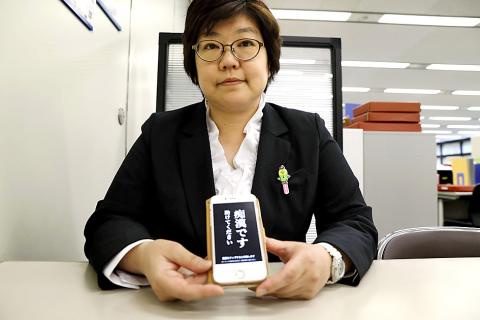A Tokyo police smartphone app to scare off molesters has become a smash hit in Japan, where women have long run the gauntlet of groping on packed rush-hour trains.
Victims of groping can activate the Digi Police app, which either blasts out a voice shouting “stop it” at top volume, or produces a full-screen SOS message — which victims can show other passengers — reading: “There is a molester. Please help.”
The app has been downloaded more than 237,000 times, an “unusually high figure” for a public service app, police official Keiko Toyamine said.

Photo: AFP
“Thanks to its popularity, the number is increasing by some 10,000 every month,” Toyamine said.
Victims are often too scared to call out for help, but by using the SOS message mode, “they can notify other passengers about groping while remaining silent,” she said.
There were nearly 900 groping and other harassment cases on Tokyo trains and subways reported in 2017, the latest available data from the Tokyo Metropolitan Police Department showed.
“But it’s the tip of the iceberg,” with victims often hesitant to come forward, Toyamine said.
Offenders face up to six months in jail or fines of up to ¥500,000 (US$5,500).
The potential jail sentence is increased to 10 years if violence or threats are used.
The Tokyo Metropolitan Police Department quietly launched the free Digi Police app three years ago. It initially aimed to provide information for elderly people, as well as parents and their children about scams or prowlers.
The function to “repel molesters” was added a few months after the launch and an online conversation about the app — caused by a female pop idol being assaulted late last year — resulted in its sudden popularity.
Yui Kimura, a 27-year-old beer shop employee on the northern island of Hokkaido, said she is always worried about groping whenever she visits the capital.
“I tend to be vigilant on Tokyo trains as dodgy men can happen to be in front of me at any time,” Kimura said.
Reina Oishi, a 21-year-old university student in Tokyo, said: “I want to download the app, as I have been groped so many times.”
Experts agree that the app could be a boon for “silent” victims.
“Molesters tend to target those who appear shy and reluctant to lodge a police complaint,” said Akiyoshi Saito, a social worker who supported about 800 former molesters during a rehabilitation program.
Groping on trains can occur in any country where trains are frequently crowded, Saito said.
“But the idea that men are superior to women, which is Japan’s traditional bias, may help sustain” sexual harassment on trains in the country, he added.
Awareness of the issue has risen in Japan in recent years, with women exchanging tips on how to avoid the unwanted attention online.
East Japan Railway runs women-only carriages during rush hours and has set up security cameras on some lines notorious for a high rate of groping.

In Italy’s storied gold-making hubs, jewelers are reworking their designs to trim gold content as they race to blunt the effect of record prices and appeal to shoppers watching their budgets. Gold prices hit a record high on Thursday, surging near US$5,600 an ounce, more than double a year ago as geopolitical concerns and jitters over trade pushed investors toward the safe-haven asset. The rally is putting undue pressure on small artisans as they face mounting demands from customers, including international brands, to produce cheaper items, from signature pieces to wedding rings, according to interviews with four independent jewelers in Italy’s main

Japanese Prime Minister Sanae Takaichi has talked up the benefits of a weaker yen in a campaign speech, adopting a tone at odds with her finance ministry, which has refused to rule out any options to counter excessive foreign exchange volatility. Takaichi later softened her stance, saying she did not have a preference for the yen’s direction. “People say the weak yen is bad right now, but for export industries, it’s a major opportunity,” Takaichi said on Saturday at a rally for Liberal Democratic Party candidate Daishiro Yamagiwa in Kanagawa Prefecture ahead of a snap election on Sunday. “Whether it’s selling food or

CONCERNS: Tech companies investing in AI businesses that purchase their products have raised questions among investors that they are artificially propping up demand Nvidia Corp chief executive officer Jensen Huang (黃仁勳) on Saturday said that the company would be participating in OpenAI’s latest funding round, describing it as potentially “the largest investment we’ve ever made.” “We will invest a great deal of money,” Huang told reporters while visiting Taipei. “I believe in OpenAI. The work that they do is incredible. They’re one of the most consequential companies of our time.” Huang did not say exactly how much Nvidia might contribute, but described the investment as “huge.” “Let Sam announce how much he’s going to raise — it’s for him to decide,” Huang said, referring to OpenAI

The global server market is expected to grow 12.8 percent annually this year, with artificial intelligence (AI) servers projected to account for 16.5 percent, driven by continued investment in AI infrastructure by major cloud service providers (CSPs), market researcher TrendForce Corp (集邦科技) said yesterday. Global AI server shipments this year are expected to increase 28 percent year-on-year to more than 2.7 million units, driven by sustained demand from CSPs and government sovereign cloud projects, TrendForce analyst Frank Kung (龔明德) told the Taipei Times. Demand for GPU-based AI servers, including Nvidia Corp’s GB and Vera Rubin rack systems, is expected to remain high,